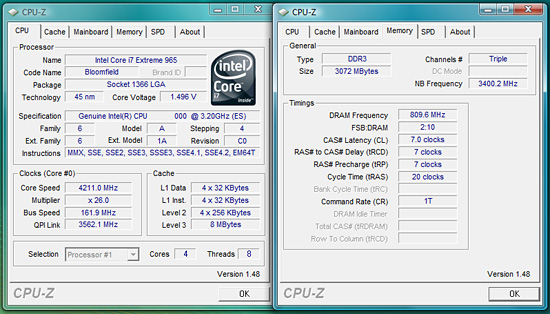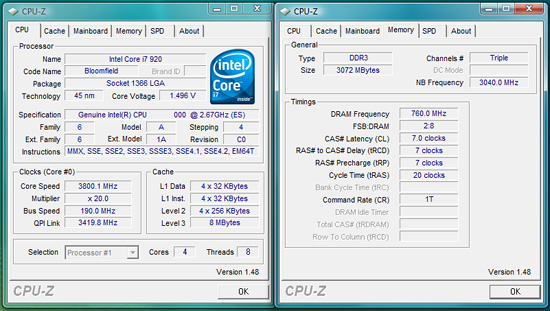The Dark Knight: Intel's Core i7
by Anand Lal Shimpi & Gary Key on November 3, 2008 12:00 AM EST- Posted in
- CPUs
Overclocking: The Initial Results
Our first overclock test with the top Core i7 processor, the 965XE, suggests an average high-end air or water-cooled, 24/7 stable overclock of about 4.2GHz (roughly the same as the latest Yorkfield-based, quad-core processors available right now). Our VCore setting had to increase to 1.5V for stable operation, a significant jump from the 1.4125V required at 4GHz on this board. We set QPI/Dram to 1.325V and VDimm to 1.65V. Our top clock with this particular CPU on our FreeZone Elite cooler is 4.5GHz with 1.55V.
Our second overclock test utilized the 920 processor that clocks in at a stock 2.66GHz. The multiplier is locked on this CPU and the 940 model so overclocking is done via Bclk. We were able to reach a 24/7 stable 3.8GHz overclock on 1.5V with memory (BIOS 0503 raised our voltage requirements) at DDR3-1520 (7-7-7-20) on 1.675V. We think 4GHz is possible on this board with additional tuning and a BIOS update. However, Bclk is limited to around 200~220 on the current i7 series, so additional headroom is probably limited on this CPU. However, performance was excellent during overclocking and a 3.6GHz overclock was possible with 1.425V. This CPU reminds us of the Q6600 at launch, an excellent overclocker that continues to be a bargain.
Although the new architecture allows for near-independent tuning of the processor cores and the underlying memory subsystem, mastering your system will still require a fair amount of patience and consideration. There are numerous tuning tradeoffs with this platform that we are still working through at this time. One such trade off is determining whether to use high CPU multipliers and standard memory ratios when overclocking versus a lower CPU multiplier and high Bclck (bus speed) combination.
In early testing, we have found advantages to both methods depending on the application. It appears right now that a combination of higher Bclk with a lower CPU multiplier will provide a slightly better performing platform, if you can properly balance the memory timings, voltages, and speed. We will help direct your efforts in this process by providing a complete overclocking guide for Core i7 shortly.












73 Comments
View All Comments
Jingato - Monday, November 3, 2008 - link
If the 920 can easily be overclocked to 3.8Ghz on air, what intensive is there to purchase the 965 for more that triple the price?TantrumusMaximus - Monday, November 3, 2008 - link
I don't understand why the tests were on such low resolutions... most gamers are running higher res than 1280x1024 etc etc....What gives?
daniyarm - Monday, November 3, 2008 - link
Because if they ran gaming benchmarks at higher res, the difference in FPS would be hardly visible and you wouldn't go out and buy a new CPU.If they are going to show differences between Intel and AMD CPUs, show Nehalem at 3.2 GHz vs 9950 OC to 3.2 GHz so we can see clock for clock differences in performance and power.
npp - Monday, November 3, 2008 - link
9950 consumes about 30W more at idle than the 965XE, and 30W less under load. I guess that OC'ing it to 3,2Ghz will need more than 30W... Given that the 965 can process 4 more threads, I think the result should be more or less clear.tim851 - Monday, November 3, 2008 - link
Higher resolutions stress the GPU more and it will become a bottleneck. Since the article was focussing on CPU power and not GPU power they were lowering the resolution enough to effectively take the GPU out of the picture.Caveman - Monday, November 3, 2008 - link
It would be nice to see these CPU reviews use relevant "gaming" benchmarks. It would be good to see the results with something like MS flight simulator FSX or DCS Black Shark, etc... The flight simulators these days are BOTH graphically and calculation intensive, but really stress the CPU.AssBall - Monday, November 3, 2008 - link
No, they don't, actually.philosofool - Monday, November 3, 2008 - link
It would have been nice to see a proper comparison of power consumption. Given all of Intel's boast about being able to shut off cores to save power, I'd like to see some figures about exact savings.nowayout99 - Monday, November 3, 2008 - link
Ditto, I was wondering about power too.Anand Lal Shimpi - Monday, November 3, 2008 - link
Soon, soon my friend :)-A